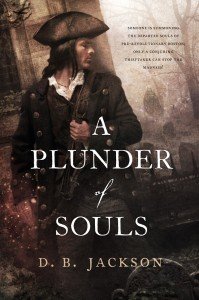I would like to welcome the fabulous D.B. Jackson (in 2012 he wrote a fine guest post on “the history that isn’t taught”). Today he tackles a rather different topic about tricks of the writing trade.
+++
Top Ten Things I Do To Help Me Write
by D. B. Jackson
Let me start by saying that I love my job. I get to make up stories for a living. That’s an actual job; I get paid for doing that. It still blows my mind whenever I think of it. I would never dream of complaining about my job in any way.
Except to say that sometimes being a writer kind of sucks. Not a lot, mind you. I mean, I did just say that I love my job, and I even meant it. But there are a few things about it that I love less than others. And there are a VERY few things — one or three or seven — that I love less than I do, say, going to the dentist, or paying parking fines. Writing can be lonely (except for all the voices in my head, which never seem to pipe down). We writers work in isolation most of the time, and that can be difficult; it can also make us a little funny. Not in a ha-ha way, but more in a when-you-see-us-coming-you-really-ought-to-cross-the-street-and-avoid-making-eye-contact way.
The writing profession is not lucrative, at least not for most of us. Sure, there are a relative handful writers who make A LOT of money, and most of us (I’m really not supposed to say this, but you won’t tell, right?) hate those guys. A lot. And while the business end of writing doesn’t make us much money, it does come with more than its share of annoyances. Someday, when you’re at a bar with a writer (we spend a good deal of time in bars) buy him or her a drink and then ask about things like “reserves against returns,” “basket accounting,” and the way publicity dollars are distributed among authors in your typical publishing house. Actually, you might want to buy the author two drinks.
For these, and a variety of other reasons that none of us really understands, writers are pretty idiosyncratic. Or put another way, we’re all just a little weird. And every writer has his or her own habits and rituals that help us get through the work day.
Joking aside, we all do little things that allow us to be more productive, to stay healthy and sane, and to ensure that writing continues to be something we love. And so, here is my list of “Top Ten Things I Do To Help Me Write.” Enjoy.

1. I keep stuff on my desk — creative talismans of a sort — that help me maintain my focus. The most important item is a small ceramic sculpture of a Storyteller, the legendary figure of the Southwestern Pueblo cultures. I bought it in Acoma, New Mexico, in 1994 from a young girl whose mother was selling pot and bowls. At the time, my career was just starting and I didn’t know if I would make it as a professional writer. This Storyteller has been with me ever since. I can’t look at it without smiling and feeling fortunate to be a author.
2. Every book I have ever written has a bird of prey in it. Why? Well, I’m an avid birdwatcher and I love hawks and owls. And birds of prey figure prominently in my first series, the LonTobyn Chronicle (written as David B. Coe). It is another way of reminding myself that I’m here; I made it to where I want to be, and I should never, ever take for granted whatever success I’ve enjoyed. So, for whatever reason, I always put a raptor or owl in my books. Look for them — you’ll find them.
3. Lots of authors listen to music when they write. Lots don’t. I do, but only certain kinds — either bluegrass or jazz. Always instrumental. I find that the improvisational quality of the music actually feeds my creativity.
4. Every weekday, before I sit down to work, I spend an hour at the gym working out. For most of my day I am pretty sedentary. That workout in the morning makes me feel better, helps me look better, and keeps me sane. For the same reason, I only allow myself a single snack in the late afternoon. No snacking before lunch, and no snacking after lunch before 3:00 pm. I do keep myself hydrated all day, but I don’t use food as a form of procrastination. If I’m not healthy, I can’t be productive.
5. I set concrete, achievable goals for every day I write, and I make myself meet them. I write fairly quickly — not as quickly as some, but at a good enough pace that I can generally write a book of 100,000 words in about three months. I didn’t always write that quickly — when I began, I wrote about 1000 words (or 4 double-spaced pages) per day. My pace today is about 2500 words per day (10 pages). But the actual number of words is not what’s important. The key is finding a pace that works for you, that allows you to get your work done at a good clip, but that doesn’t set you up for failure each day by demanding too much.
6. Another of my desktop talismans is a horoscope that was published while I was writing my first book. Essentially the horoscope said that I should pursue my passion and dreams, and that I should ignore those who don’t think I can be successful. That’s pretty good advice, and having that horoscope on my desk ensures that I don’t forget it.
7. I write full time. I’m very lucky that way — it’s my only job. And I treat it like a job. I work Monday through Friday — I do relatively little work on weekends. And I also work regular hours — I usually knock off from work in the late afternoon (unless I haven’t met my word count goal for the day). My point is that I reserve time for myself, for my kids, for my wife. If I didn’t, I would have burned out long ago.
8. I keep moving forward. Sometimes I will be working on a scene and I’ll realize that there are things that need fixing in earlier chapters. But I do not go back and fix them then; instead I make a note in an “Edits” file and I keep moving forward. For me, momentum is crucial. As soon as I stop to revise, I lose my rhythm and energy and my work in progress begins to languish. Make notes and keep moving forward. That’s what works for me.
9. I always — ALWAYS — write with a dictionary and a thesaurus by my side. It’s not that I use a thesaurus incessantly to come up with new, novel, innovative, fresh words. (See what I did there?) But sometimes I’m stuck for a word. Sometimes I want to know the precise meaning of the word I intend to use. Sometimes I need to know when the word I’m considering entered the language. Between the dictionary and the thesaurus I can usually find the information I need.
10. Sometimes I don’t write. Sometimes I take a few hours off to hike or birdwatch or take my camera out and shoot some pictures. Sometimes I take my guitar out and play some music. I can’t write well if I’m not fresh, and I can’t stay fresh if I don’t do things that I love to do.
So there’s my list. Do you have one, too? What does yours look like?
*****
D.B. Jackson is also David B. Coe, the award-winning author of more than a dozen fantasy novels. His first two books as D.B. Jackson, the Revolutionary War era urban fantasies, Thieftaker and Thieves’ Quarry, volumes I and II of the Thieftaker Chronicles, are both available from Tor Books in hardcover and paperback. The third volume, A Plunder of Souls, will be released in hardcover on July 8. The fourth Thieftaker novel, Dead Man’s Reach, is in production and will be out in the summer of 2015. D.B. lives on the Cumberland Plateau with his wife and two teenaged daughters. They’re all smarter and prettier than he is, but they keep him around because he makes a mean vegetarian fajita. When he’s not writing he likes to hike, play guitar, and stalk the perfect image with his camera.



